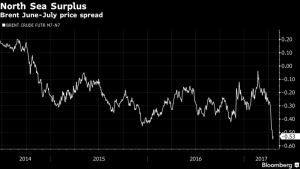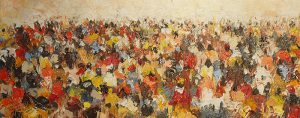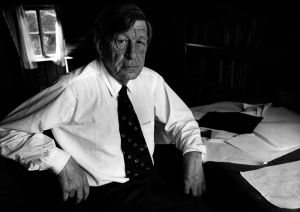 We wish they were more rare. But just as rising wages are bad news for business(?) and solar most horribly spells doom for coal, word in the oil game is that consistent catastrophes are needed for oil to remain strong:
We wish they were more rare. But just as rising wages are bad news for business(?) and solar most horribly spells doom for coal, word in the oil game is that consistent catastrophes are needed for oil to remain strong:
The weakness comes at a time when speculators have started rebuilding bullish positions after a sell-off last month, betting the market will tighten in the second quarter. Yet, Brent physical oil traders say the opposite is happening so far, according to interviews with executives at several trading houses, who asked not to be identified discussing internal views.
“We need to see the market going really into deficit for oil prices to rise,” Giovanni Staunovo, commodity analyst at UBS Group AG in Zurich, said. “If this is temporary, it could be weathered, but it needs to be monitored.”
The weakness is particularly visible in so-called time-spreads — the price difference between contracts for delivery at different periods. Reflecting a growing surplus that could force traders to seek tankers as temporary floating storage facilities, the Brent June-July spread this week fell to an unusually weak minus 55 cents per barrel, down from parity just two months earlier. The negative structure is known in the industry as contango.
There’s a new word for you. And yes, many of the other words they use are the ones you know, with commonly agreed-upon definitions. I know one needs a lot of sophisticated financial knowledge to really get the subtleties of these economics, but is the overall message really lost? Of no consequence whatsoever? Yes, we can play terrible music on beautiful instruments, just as we can vote against our interests and condemn ourselves with our own words ( though it really isn’t necessary to do all three at once). Thanks to Bloomberg for delivering the straight dope in the top story today. It’s important, you know? Just like it will be to move past the market riff, as I hope to soon.
And also, the term ‘oil futures.’ FY, irony.

 :
: Like smartphones teach us to be dumb – to not know things, to not be able to find our way except by using the device – we are also learning how to forget the past. Or how to remember it inaccurately, disconnected from the forks in the road where our path darkened and we lost something irretrievable, something we did not make nor deserve but that came from us and birthed us, was us, the best and the worst, that pushed us in the right direction because we were scared to go on our own until we learned we could pull ourselves there if we could just join enough hands.
Like smartphones teach us to be dumb – to not know things, to not be able to find our way except by using the device – we are also learning how to forget the past. Or how to remember it inaccurately, disconnected from the forks in the road where our path darkened and we lost something irretrievable, something we did not make nor deserve but that came from us and birthed us, was us, the best and the worst, that pushed us in the right direction because we were scared to go on our own until we learned we could pull ourselves there if we could just join enough hands. In a society wherein it is the final arbiter, is the market beyond criticism?
In a society wherein it is the final arbiter, is the market beyond criticism? Interesting op-ed on a
Interesting op-ed on a  No need to resist this. From an interview with W.H. Auden, published in
No need to resist this. From an interview with W.H. Auden, published in  So… who ever thought The Cossacks Work for the Czar would become a literal trope? If you are keeping score at home, and really should be, the
So… who ever thought The Cossacks Work for the Czar would become a literal trope? If you are keeping score at home, and really should be, the  For a long time, I’ve thought that living in Republican-dominated states, especially in the South, was a form of being on the front lines – of racism, of anti-union sentiment, of hostility to immigrants and civil rights broadly construed. Even the lesser evils of being among people who feel over-taxed, persecuted for their (in every sense dominant) religious beliefs, sub-par infrastructure (no mass transit and the promotion of personal automobiles as priority transportation concerns) and general discomfort with the world as more people deservedly take their places in it, you are confronted with this it all up close. You know what it’s like and grow accustomed to fear and self-loathing as it leaks out everywhere among the shiny automobiles and neat, though increasingly sad [and appropriately named] subdivisions. After not too long, you begin to sense among the dominant political persuasion an uneasiness that borders on paranoia. The lack of confidence about the way things are going, despite the fact that they are in charge, is unmistakable and results in all kinds of frantic attempts
For a long time, I’ve thought that living in Republican-dominated states, especially in the South, was a form of being on the front lines – of racism, of anti-union sentiment, of hostility to immigrants and civil rights broadly construed. Even the lesser evils of being among people who feel over-taxed, persecuted for their (in every sense dominant) religious beliefs, sub-par infrastructure (no mass transit and the promotion of personal automobiles as priority transportation concerns) and general discomfort with the world as more people deservedly take their places in it, you are confronted with this it all up close. You know what it’s like and grow accustomed to fear and self-loathing as it leaks out everywhere among the shiny automobiles and neat, though increasingly sad [and appropriately named] subdivisions. After not too long, you begin to sense among the dominant political persuasion an uneasiness that borders on paranoia. The lack of confidence about the way things are going, despite the fact that they are in charge, is unmistakable and results in all kinds of frantic attempts  There exists a misunderstood or mischaracterized mantra, if we will, that you cannot really succeed without the possibility of failure. And it would seem to make sense, though it is often enough forgotten how much trouble the very rich have over-compensating for the fact that they don’t feel legitimate in their own eyes. (There is a very good novel idea in there somewhere, and you get to it before me, good on you). There is also a specific case of sometimes, if green means that you win even if you lose, how were you
There exists a misunderstood or mischaracterized mantra, if we will, that you cannot really succeed without the possibility of failure. And it would seem to make sense, though it is often enough forgotten how much trouble the very rich have over-compensating for the fact that they don’t feel legitimate in their own eyes. (There is a very good novel idea in there somewhere, and you get to it before me, good on you). There is also a specific case of sometimes, if green means that you win even if you lose, how were you  How long will this last? How much can you take? Do you have a line that won’t be crossed? Do you have a budget for direct action?
How long will this last? How much can you take? Do you have a line that won’t be crossed? Do you have a budget for direct action?